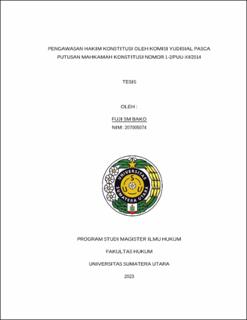| dc.description.abstract | This research is based on Article 24B paragraph (1) Indonesian Constitution 1945 which states: "The Judicial Commission is independent with the authority to propose the appointment of Supreme Court judges and has other powers in order to maintain and uphold the honor, nobility, dignity and behavior of judges". The constitutional mandate shows the authority of the Judicial Commission as an external control institution for judges to enforce the code of ethics in order to realize integrity of judges. This authority then resulted in a great debate in the Indonesian constitutional structure, especially in the two judicial institutions that became the object of controlling by the Judicial Commission, namely the Supreme Court and the Constitutional Court. At least the Constitutional Court issued Constitutional Court Decision Number 005/PUU-IV/2006, which stipulated that Constitutional Judges were not part of the Judges who received controlling from the Judicial Commission, then further emphasized through Constitutional Court Decision Number 1-2/PUU-XI/2014 which further emphasized that the controlling carried out by the Judicial Commission against Constitutional Judges was unconstitutional and violated the principle of checks and balances system, which then resulted in a legal vacuum for external controlled of Constitutional Judges. The formulation of the problem in this study (1) How controlling between state institutions in order to create/uphold a check and balances system in the structure of state institutions in Indonesia?, (2) How is the controlling of Constitutional Judges by the Judicial Commission after the Constitutional Court Decision Number 1-2/PUU-XI/2014?, (3) How is the ideal controlling model for Constitutional Judges?. This research uses a normative juridical method with a conceptual approach and statue approach, this paper concludes that the controlling of constitutional judges by the Judicial Commission is appropriate because the 1945 Constitution explicitly provides the authority to supervise judges by the Judicial Commission, to maintain and uphold the honor, nobility, dignity and behavior of judges. Finally, this paper recommends the MPR to amend the 1945 Constitution specifically in the judicial power chapter by emphasizing the definition of judges who are the object of controlling by the Judicial Commission, as well as reorganizing the systematics of institutions related to judicial power by rearranging the order of the articles. | en_US |


